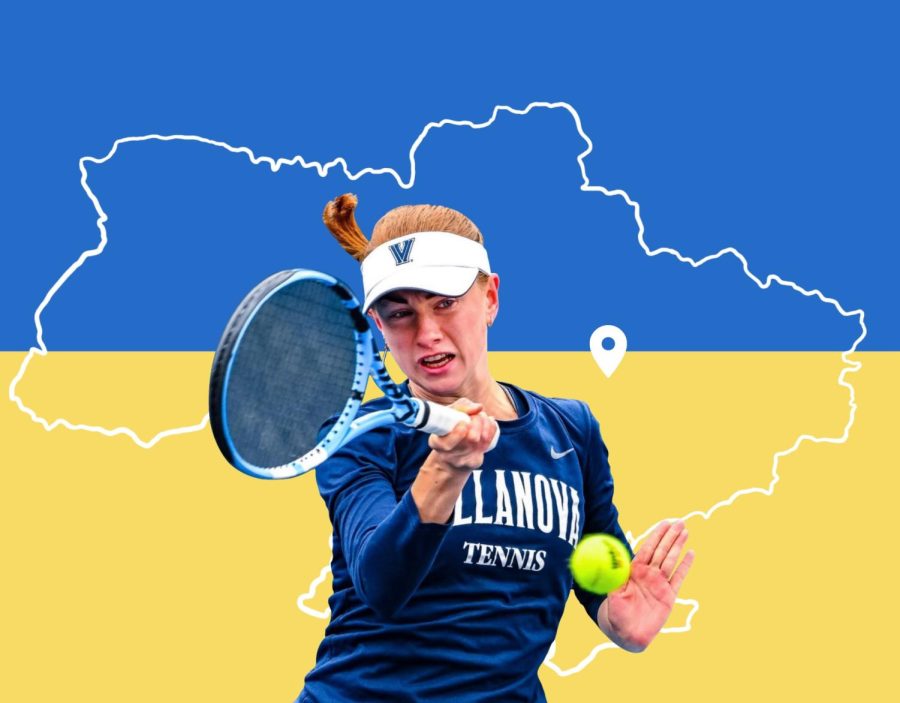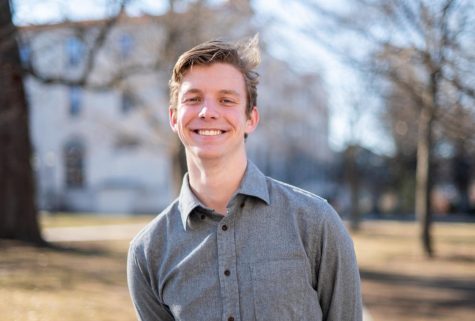“I Play For Ukraine”: With War At Home, Kornieva Competes For Country
Design By Rachel Reiniger/Digital Editor, Photo Courtesy of Villanova Athletics
Valieriia Kornieva, a freshman tennis player from Dnipro, Ukraine, plays for more than just Villanova on the court.
April 13, 2022
On February 24, what was supposed to be a quick check of the news before bed turned into a nightmare for freshman tennis player Valieriia Kornieva.
“It was Thursday, and I was going to bed,” Kornieva said. “I didn’t even expect anything.”
However, the reports began to flood her feed, announcing a catastrophe. Russia had begun military action and invaded Kornieva’s home of Ukraine, suddenly engulfing Kornieva’s family and friends in war. At first, Kornieva didn’t believe it, but when she checked again and saw the videos of attacks against the capital, Kyiv, she knew it was true.
“When I saw video and sounds of shooting, I immediately called my parents,” Kornieva said. “My father said that they woke up from [guns shooting]. I was terrified. I began to cry. … I didn’t sleep that first night because you don’t really know what will [happen].”
That day started as any other Thursday would have, as Kornieva prepared for the impending spring tennis season. Kornieva struggled with injury in the fall, preventing her from playing. On that Thursday, Kornieva was less than a week away from her collegiate debut, as a March 1 meeting with Lipscomb loomed. However, with the news of Russia’s invasion, tennis no longer seemed as important.
Kornieva is from Dnipro, the fourth largest city in Ukraine, with a population of more than a million people. Dnipro is a beautiful city in the Eastern part of the country, located along the Dnieper river, and if she could choose, Kornieva would spend her whole life there. In the initial stages of the invasion, Kornieva hoped that Dnipro would be spared and the Russians would focus their efforts on Kyiv, Odessa and Kharkiv, but when her father was awakened by the sound of gunfire, they knew that the war had come to them. Adding to the danger was the fact that the family lived near Dnipro’s airport, so Kornieva’s father, mother and younger sister packed their things and headed west to the safer confines of their grandmother’s city. Staying informed from afar, Kornieva feared for her family.
“My body was shaking,” Kornieva said. “Because when they travel between cities, it’s so dangerous.”
After leaving Dnipro, Kornieva’s mother and sister made plans to leave the country, heading further west before going to Poland, where Kornieva’s Villanova teammate and now-doubles partner, Sabina Grigorian, has a house. The two made it across the border and to Poland, where they now stay, but Kornieva’s father was unable to leave due to a Ukrainian declaration forbidding men aged 18-60 from leaving the country. He currently volunteers in Western Ukraine, one of the safer parts of the country, yet still faces consistent vulnerability. Kornieva’s grandparents and many of her friends are still in dangerous situations further east.
“I was talking one time with my friend on FaceTime, and I heard emergency alarms on the street,” Kornieva said. “I can’t imagine how they’re able to handle hearing these alarms. It’s so painful, everything that they now experience. It’s hard.”
Kornieva’s family made it out just in time. In Kyiv and across the country, Kornieva has seen many places that she visited and where she competed in tennis tournaments reduced to rubble. On April 10, Dnipro’s airport was completely destroyed.
“I feel like it’s really affecting everyone,” Kornieva said. “Especially me, when I see all this news, and I can really believe that now [this] can happen and it’s really my country. I saw a lot of places where [I spent] my childhood, [where] I played a lot of tennis tournaments and where I spent all of my life. Now, there’s really nothing.”
Growing up, tennis was always seen as an opportunity for Kornieva, the pathway to academic opportunities in the United States. Kornieva began playing the sport at age seven, dropping other activities like dance in order to focus solely on tennis. As she won matches and developed into one of the best players of her age in the country, Kornieva hired a recruiting service to send her academic and athletic information to schools. Although Villanova does not offer scholarships for tennis, when Kornieva’s tape found its way to head coach Steve Reiniger, he knew that this was a player he wanted.
“I liked what I saw,” Reiniger said. “And she hasn’t disappointed.”
There were numerous hurdles to manage, including academic requirements for admission, Villanova’s lack of financial aid for international students and barriers with recruitment and visiting schools during COVID-19. But when Kornieva saw Villanova’s academic reputation and the tennis team’s rankings, she knew it was the best option.
Throughout her first months on campus, Kornieva was focused on making the most of the opportunities Villanova had to offer, as well as recovering from her injury. Preparing for a full season, Kornieva still saw tennis as both a tool for opportunity and a responsibility, but after Feb. 24, tennis became an escape.
In her collegiate debut, Kornieva lost, falling in both sets, 6-4. She lost her second match as well, dropping both sets against Belmont, 6-2. However, after a two week scheduling break, Kornieva has caught fire, winning five of her last seven singles matches.
“To be honest, I don’t know how I handle everything that’s going on and can perform well on [my] tennis matches,” Kornieva said. “I’m just trying to forget what’s happening in Ukraine and overall in the world, and just concentrate all my attention to tennis and just try to enjoy the moments of the game. Tennis is what I’m passionate about. It’s helped me a lot, mentally.”
Around the team, Kornieva always remains positive, keeping morale high regardless of how she’s doing. She sees it as her duty to not let her situation affect the team, especially in the midst of the season.
“She is amazing,” Reiniger said. “I don’t think she ever has a bad day. I look at her and she’s just constantly smiling. I guess she just compartmentalizes well and just blocks it out when we’re in a match. Once in a blue moon you can tell it’s on her mind, but that’s very seldom.”
“My parents always taught me to be strong and [to] not give up,” Kornieva said. “For everyone, now is difficult, for my parents, for Ukraine. We are [a] strong nation, we can handle a lot.”
What weighs on Kornieva’s mind most is her family, both with their safety and when she will be able to see them again. There are plans in the works to bring her mom and sister to the U.S. in the summer, but for now, her family follows Kornieva’s successes from afar.
“They are so happy,” Kornieva said. “For them, it’s really good news. [I’m] really happy that they can [celebrate] for me. When I finish a match, I immediately text my parents that I won because I am sending them something that can [make them] smile, be happy and be proud of me.”
Five thousand miles and a world away from Ukraine, Kornieva may be safe, but she badly misses her family and her country. As the war drags on, returning to Dnipro or seeing her dad will be difficult, and with so much uncertainty, she takes nothing for granted.
“I miss my family,” Kornieva said. “I hope maybe my mom and sister will come to [the U.S.] during summer, but I can’t say exactly. Now, to make a plan, it’s so hard. I hope it will work and I will be so happy to meet my mom and sister.”
Kornieva still struggles to comprehend what is happening in her home.
“Before [this] war, these topics were far away from my life,” Kornieva said. “It will not touch me, I would just read [about it] in history books. But now, it’s really happening.”
Her tennis team next plays in the Big East Championships, representing Villanova against the best of the conference. However, Kornieva will represent her family and something much bigger.
“I play for Ukraine,” Kornieva said. “I am representing my country. I do all of this for my country.”



